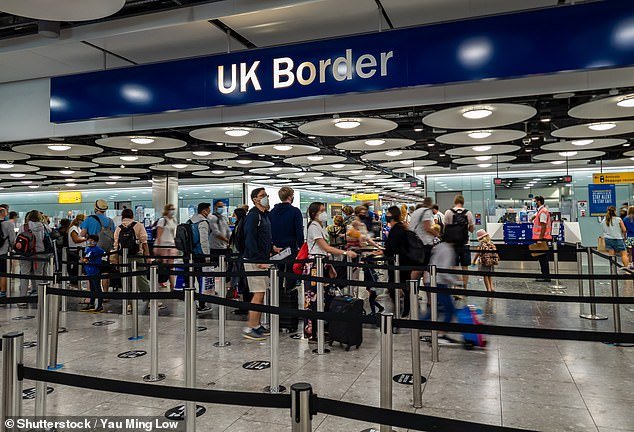The Home Office fails to collect ‘basic information’ on foreign workers including whether they carry on working illegally in the UK at the end of their visas, MPs have warned.
The Commons’ Public Accounts Committee (PAC) found the department ‘does not know’ how many foreign visa holders leave the country when they are supposed to.
A damning new report, published today, raised serious concerns about the operation of the skilled worker visa system which was brought in at the end of 2020.
It comes after a Daily Mail investigation into a ‘cash for care jobs scandal’ last year found some agents charging overseas applicants fees of up to £20,000 to help them get a visa allowing them to come – and stay – here.
The PAC’s report said: ‘We asked the Home Office whether it knows if people leave the country when their visa expires.
‘The Home Office told us the only way that it can tell if people are still in the country is to match the data it holds on individuals with the passenger data it receives on people using airlines.

More than a million foreign nationals applied to come to Britain under the skilled worker visa in the first two years after it was launched
‘The Home Office has not analysed exit checks since the route was introduced and does not know what proportion of people return to their home country after their visa has expired, and how many may be working illegally in the United Kingdom.’
It added that officials had told the committee the problem ‘was not solved’ but there was ‘scope to strengthen exit checks’ under a new digital visa system currently being rolled out.

The Commons’ Public Accounts Committee found glaring gaps in the Home Office’s ability to track whether foreign nationals leave Britain at the end of their work visa
The cross-party committee of MPs urged the Home Office to do far more to tackle visa overstayers.
It recommended the department should ‘undertake a full assessment … to identify gaps in its response’, including studies of specific work sectors which should be updated every six months.
Home Secretary Yvette Cooper should also make sure the Home Office can ‘identify what data is needed to strengthen its response, including how to better understand what happens to people at the end of their visa’, it added.
PAC chairman Sir Geoffrey Clifton-Brown said: ‘From when the government opened the skilled worker visa route in December 2020 up to the end of 2024, 1.18million people applied to enter the UK.
‘Our report finds that this speed came at a painfully high cost – to the safety of workers from the depredations of labour market abuses, and the integrity of the system from people not following the rules.
‘There has long been mounting evidence of serious issues with the system, laid bare once again in our inquiry.
‘And yet basic information, such as how many people on skilled worker visas have been modern slavery victims, and whether people leave the UK after their visas expire, seems to still not have been gathered by government.’
In the wake of the visa changes in 2020, net migration – the difference between those coming to live long-term in Britain and those emigrating – hit a record 906,000 in the 12 months to June 2023.

The MPs recommended Yvette Cooper, the Home Secretary, devises proper systems to keep track of migrants after their visas expire
It then fell to 413,000 last calendar year after the Tory government tightened the rules.
A visa allowing overseas recruitment of care workers was particularly vulnerable to abuse, and saw 648,100 applications, including dependants, between 2022 and last year.
Earlier this week the Home Office set out measures to phase out foreign care worker recruitment, plus a range of other new restrictions on other types of visa.
Sir Geoffrey added: ‘Further changes are now underway in this system, with an end to the overseas recruitment of care workers.
‘Without effective cross-government working, there is a risk that these changes will exacerbate challenges for the care sector.
‘Government now needs to develop a deeper understanding of the role that immigration plays in sector workforce strategies, as well as how domestic workforce plans will help address skills shortages.
‘Government no longer has the excuse of the global crisis caused by the pandemic if it operates this system on the fly, and without due care.’

